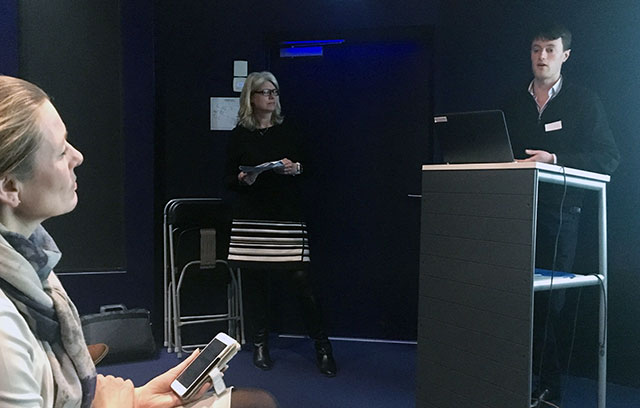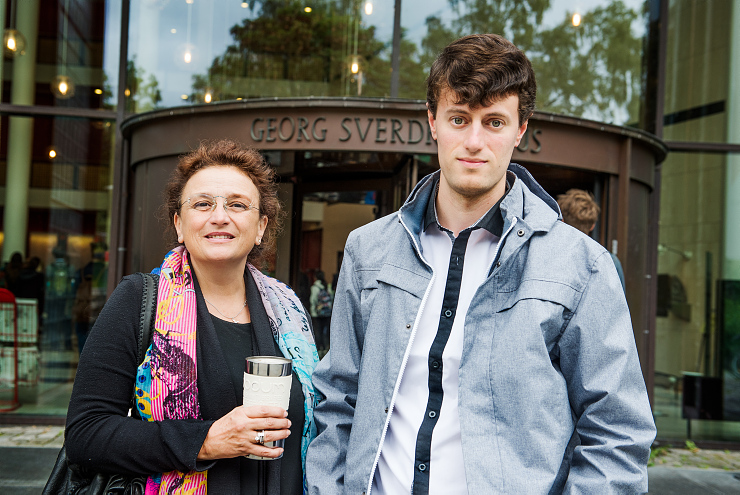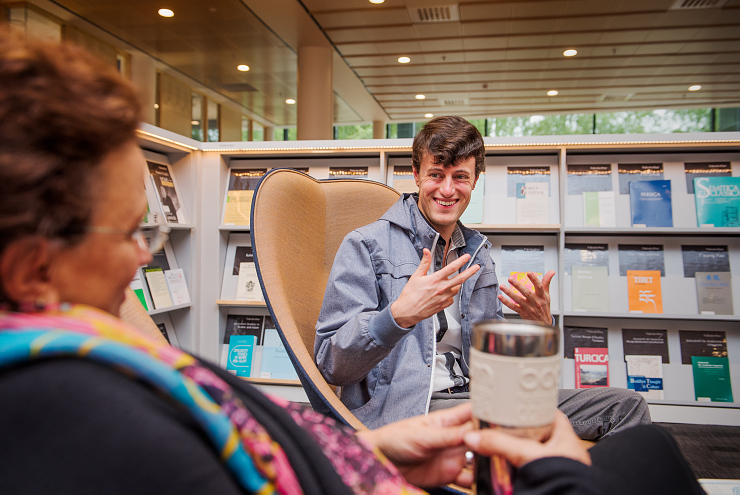Enrico Catalano is a postdoctoral fellow at the EU COFUND programme Scientia Fellows and works at the Department of Clinical Molecular Biology (EpiGen), a research laboratory shared between Akershus University Hospital and The Institute of Clinical Medicine, University of Oslo. He is a part of the research group Cancer Genomics for breast cancer, led by his host professor Vessela N. Kristensen.
Catalano is doing research on how to translate the application of nanomedicine solutions to common clinical practice. As an invited speaker he will give a lecture about ”Cancer Nanomedicine and Nanotheranostics” at the upcoming International Conference and expo on nanotechnology 2018 in Dubai in April.
Recently he also became representative officer of UiODoc, the association of interest for PhD student and postdoctoral fellows of University of Oslo. UiODoc addresses the needs and opinions of PhD students and postdocs by acting as their voice within the UiO management.
We asked him some questions about his Scientia Fellows experience.
– So, tell us about your Scientia Fellows-projects?
– My project aims to implement an extremely innovative multi-therapeutic strategy that combines the use of magnetic iron-oxide nanoparticles’ properties for targeted drug delivery and hyperthermia to target in vitro breast cancer drug-resistant and not drug-resistant cell lines.
– The project wants to achieve a smart nanomedicine platform of targeted drug delivery for cancer treatments based on magnetic properties of iron-oxide nanoparticles that overcomes multiple biological barriers for cancer drug delivery to target accurately the cancer site with magnetic nanoparticles under the influence of an external magnetic field.
–Breast cancer is the most frequently diagnosed cancer and the leading cause of cancer death among females worldwide, accountings for 25 per cent of all cancer cases and 15 per cent of all cancer deaths among females. Moreover, a certain proportion of breast cancer patients present with resistance to drug therapy, making it much more difficult to control the deterioration of the disease.

What do you hope to find out with your research?
– The “moonshot” of my research is to find a new therapeutic strategies to cure triple-negative breast cancer (TNBC) that is a challenging disease with the poorest prognosis of all breast cancer subtypes. Moreover, the hope is also to find integrative therapeutic approaches together with nanomedicine to treat especially drug resistant breast cancer types that are hard to manage with normal treatments and that result drug-resistant to chemotherapy.The final goal is to be innovative and multidisciplinary to identify a new experimental strategy to treat breast cancer with the goal of a personalized breast cancer nanomedicine.
What is your greatest achievement or moment in your career – in your opinion – so far?
– During my carreer I received several grants and awards, such as travel grants from an EU funded programme COST for cooperation in Science&Technology. NanoInnovation Got Talent 2016 supported by “Bracco Foundation” was one of the most prestigious awards that I received last year in Rome (Italy) during the International Conference Nanoinnovation 2016 like one the best young nanotechnology researchers.
–In 2015 I participated in Silicon Valley Study tour 2015 with a scholarship awarded by Italian Ministry of Foreign Affairs and I had a possibility to visit the greatest entrepreneurial and academic realities of Silicon Valley like Facebook, Google, Hewlett-Packard (HP), Universities of Stanford and Berkeley, etc.
–A great achievement of my career was to receive a world patent (WO/2015/036875) about compositions comprising natural compounds and phytochemicals useful for the treatment of tumors resistant to chemotherapy.
How is a typical day for you as a SF-fellow?
–My research work is spent between EpiGen lab in the Akershus University Hospital where I do the part of biological experiments and in vitro characterization of iron-oxide nanoparticles on breast cancer cells, while I do the rest of physicochemical characterizations of nanoparticles at Institute for Cancer Research in Radium Hospital.
During weekend I meet up with several friends that I knew here in Oslo with a wounderlful night life and events that you can join, or otherwise I go to hiking, swimming, do sports in the enchanting scenery of the fjord and lakes near Oslo.
Why did you choose to apply for a Scientia Fellows postdoctoral position?
– I was attracted bythe possibility to come here in Norway with a prestigious status related to a Marie-Curie fellowship and I was excited to collaborate with my current supervisor professor Vessela Kristensen that has an internationally recognized and excellent reputation about genomics and epigenetics aspects of breast cancer and her results have attracted considerable attention.
What have you learned as a SF-fellow so far?
– I learned that the mission of science and medicine is to overcome human limits and achieve the best efforts with all actors: professors, researchers and clinicians with the aim of improving the quality of life of patients and finding new therapeutics solutions to the challenges of cancer treatment.
How does participating in Scientia Fellows benefit postdoctoral candidates?
– The participation to Scientia Fellows postdoctoral program offer a huge amount of possibilities and great opportunities for careers of young researchers in academia and industry thanks to different postdoctoral courses that the Faculty of Medicine of University of Oslo organize related to career development, research management and attract external fundings.
– Moreover, in the future UiO planned to erect a new centre of Excellence in Life Science commissioned by the Norwegian Ministry of Education and Research, and completion of the building is projected for 2023. A strategy to change the paradigm of Oslo like a city with a great International center for Medicine and Life Science to attract the highest top-talented researchers and professors.
Why would you recommend a Scientia Fellows postdoctoral position?
– I recommend it because Oslo is a great city where you can do research with very good opportunities of funding and research networking. In addition, Norway has a strong relationship with nature and is trying to implement an effective sustainable economic development and research investments are a priority from Norwegian government for the future development of society. The Scientia Fellows programme allows you to scale-up your career with postdoctoral programme and School of health innovation and discover the great possibilities related to the chance of Oslo to become Life Science city within the next 10 years.

Research group
Cancer Genomics for breast cancer
